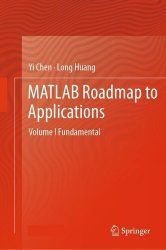 Название: MATLAB Roadmap to Applications: Volume I Fundamental Название: MATLAB Roadmap to Applications: Volume I Fundamental
Автор: Yi Chen, Long Huang
Издательство: Springer
Год: 2025
Страниц: 611
Язык: английский
Формат: pdf (true)
Размер: 10.1 MB
This book presents a comprehensive guide to MATLAB programming, catering to students, engineers, and researchers seeking to harness MATLAB as a powerful tool for their work. The text meticulously covers fundamental concepts, progressing from basic elements such as types and operators to more complex structures like arrays and matrices. It elucidates key programming constructs including selection statements, loop structures, scripts, and functions, providing readers with a solid foundation in MATLAB programming.
The book's structure is carefully crafted to facilitate step-by-step learning, with each chapter building upon previous knowledge. Abundant examples and exercises reinforce understanding, while dedicated sections on data visualisation, algorithm development, and practical applications in engineering, science, and finance demonstrate MATLAB's versatility across disciplines.
MATLAB, a powerful mathematical software package, has become an indispensable tool for engineers, scientists, and researchers in various academic and industry domains. Its versatility in data analysis, visualization, computing, and simulation has made it a cornerstone of many fields, including energy, manufacturing, transportation, healthcare, supply chain, information technologies, aerospace, business, and finance, just name a few.
A distinguishing feature of this volume is its inclusion of laboratory work and coursework, allowing readers to apply theoretical concepts to real-world scenarios. This hands-on approach enhances the learning experience and prepares users for practical implementation of MATLAB in their respective fields.
In the current era of Artificial Intelligence, this book serves as an essential resource for those seeking to leverage MATLAB's capabilities. It not only equips readers with programming skills but also illustrates how MATLAB can be integrated into cutting-edge research and industry applications.
MATLAB provides an IDE that combines a code editor, debugger, and Visualisation tools, facilitating the entire workflow from initial prototyping to final implementation. The IDE offers a user-friendly interface, making it accessible to both novice and experienced users. One of MATLAB’s key strengths is its high-level programming language that leverages matrix and array operations, enabling concise and efficient code development for scientific and engineering computations.
The MATLAB language is designed to perform numerical computations efficiently, with built-in support for linear algebra, signal processing, image processing, and other mathematical functions. It also provides powerful data Visualisation capabilities, allowing users to create high-quality 2D and 3D plots, graphs, and animations to explore and communicate their data effectively.
MATLAB is highly extensible through the use of toolboxes, which are collections of specialised functions and applications tailored to specific domains, such as control systems, machine learning, optimisation, and finance. These toolboxes expand MATLAB’s functionality, enabling users to tackle a wide range of problems and leverage cutting-edge algorithms and techniques.
Furthermore, MATLAB seamlessly integrates with other programming languages and technologies, including C, C++, Fortran, Java, .NET, and Python, allowing for interoperability and code reuse across different platforms and systems. This flexibility makes MATLAB an invaluable tool for developing and deploying applications in diverse environments, from embedded systems to cloud computing platforms.
Contents:
1. Introduction
2. Data Types, Operators, and Expressions
3. Vectors, Arrays, Matrices, and Data Structures
4. Conditional Statements
5. Loop Statements
6. Scripts and Functions
7. Inputs and Outputs
8. Graphics and Data Visualisation
9. Programming and Algorithm Development
10. Object-Oriented Programming
Скачать MATLAB Roadmap to Applications: Volume I Fundamental
|